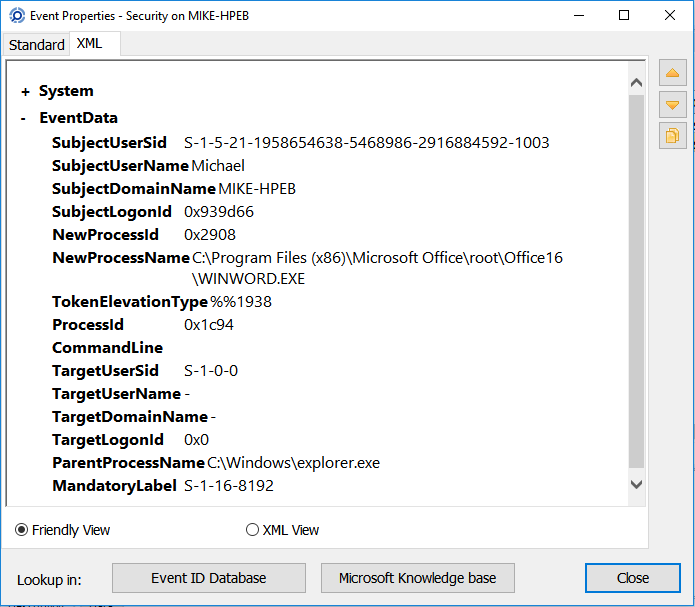You can also query event data from the Sysmon log with Windows' built-in ... a remote computer and how to filter returned events using an XPath query, run wevtutil/?. Another option is the Get-WinEvent cmdlet in Windows PowerShell v2.0 and ... This example command gets all Sysmon events on the local computer into a .... When scripts are large the PS logging (specifically ... I can filter out the first and last logs from these using a query ... but with XPath there is no way to filter out events that have the same ScriptBlockId as another event.
I have recently spent some time working with Xpath queries as part of Event Log filtering in Windows Server 2008. It's a great feature, but one .... It is suggested to use XPath queries when you are searching the event logs for a simple expression from a single source. Use an XML structured query when you are searching from more than one event log source or you are using a compound expression with a dozen or more expressions.
Siri en un iPad de primera generacion
Learn to create and use a PowerShell script for event log querying in ... 'OU=Domain Controllers,DC=lab,DC=local' -Filter * | Select-Object ... Name | foreach { Get-WinEvent -ComputerName $_ -LogName Security -FilterXPath .... WEF supports XPath as a query language to implement such filters. ... For simple queries that select events from a single source, using an XPath expression is ... for PowerShell logging, and enable Script Block, Module, and Transcript logging.. When I want to search for events in Windows Event Log, I can usually make ... Date Sun 19 May 2013 Tags Security / Scripts / Windows / PowerShell / Ramblings / Event Log ... Not only can you filter events using XPath on the event's XML node, ... When querying for events using PowerShell, you might get empty messages. Serious aircraft ‘near-misses’ double


Often when diagnosing problems you can filter logs only to Critical, Error ... Working with Windows Events in PowerShell ... For this article, I will focus on the two most important commands from my perspective. ... FilterXPath – Specifies an XPath query that this cmdlet select events from one or more logs.. Windows Event Log supports a subset of XPath 1.0. ... If you don't mind two passes, you can always use a powershell script to re-filter the data as its -where operator supports ... $events = Get-WinEvent -FilterXml $Query ForEach ($Event in $Events) { # Convert the event to XML $eventXML = [xml]$Event.. It is a part of an on-going blog series on PowerShell commands. ... Get-WinEvent allows you to filter events using XPath queries, structured ... About Remote Forensics

FullName -xpath "//Name" } | Select-Object -ExpandProperty Node ... You can now use the command get-EventViewer at the PowerShell prompt to ... To create new Custom Views, see Creating Get-WinEvent queries with FilterHashtable. ... work with the Event Viewer and be able to look or filter for events?. This function will generate an xpath filter for querying windows events. The expath generated here can be used with the -FilterXPath parameter .... The easiest solution was to use Filter command and type file name in the ... so to query event by UserData, we should use the following XPath .... r/PowerShell: Windows PowerShell (POSH) is a command-line shell and ... you get the events using the xpath. You should be able to use (each event) $event. ... does not exist or one of its queried reference-property objects are not present.. You can always use a powershell script and pass the XML through powershell's where function (supports -contains -like -match):. nv.ps1 $Query .... Gets events from event logs and event tracing log files on local and remote computers. ... The Get-WinEvent cmdlet gets events from event logs, including classic logs, such as the System and Application logs. The cmdlet gets data from event logs that are generated by the Windows Event ... 3d2ef5c2b0 Jan. 9, 2020 – Readings in Recovery: A Day at a Time